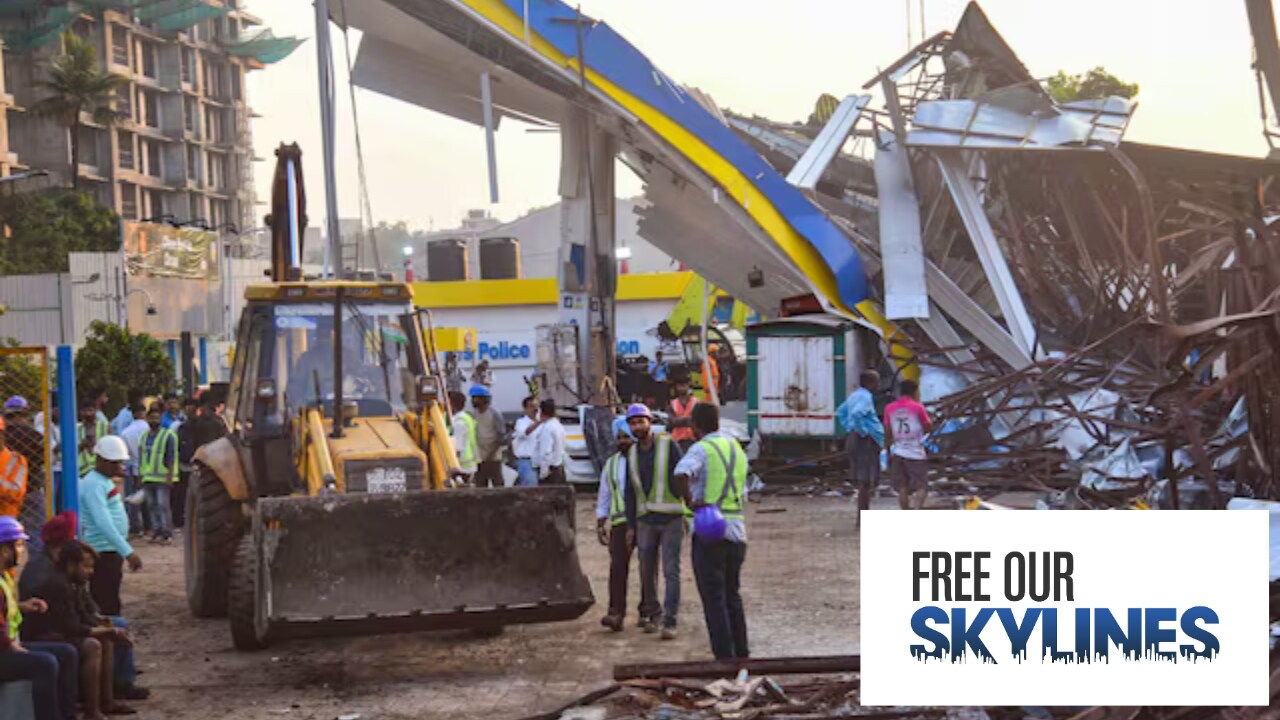May 13 was a dark day for Mumbaikars. The sad tragedy in Mumbai which resulted in over 17 fatalities and over 75 injuries due to illegal commercial hoarding, could have been avoided. When the installation exceeded the permitted size by three times, the agency Ego Media was sent notices by the civic authorities; citizens themselves issued warnings against the size of the hoarding but to no avail.
Even though the awful tragedy cannot be erased from history, Storyboard18 spoke with experts to learn how the industry can advance and improve moving ahead to ensure that incidents like the Mumbai hoarding collapse never happen again.
“Illegal hoardings are a challenge. In cities the size of our metros, the number of hoardings is so large that it is unlikely a centralised body can manage and comply with the rules the same body itself sets out. The best method would be to decentralise city management, funds and oversight, with better local accountability,” suggested Alagu Balaraman, CEO, Augmented SCM.
Centralised control and weak enforcement usually lend themselves to organised lawbreakers. To correct it, decision-making authorities need to be closer to the ground and deal with smaller areas that can be physically monitored. They should be more accessible to the public living there.
Another approach, according to Balaramam, is to use technology to manage better. “Our traffic police use automatic cameras to identify and fine traffic violations. Challans are electronic. Similarly, technology can be used to monitor and tag hoardings. However, to do this, there needs to be a will to bring about change,” he said.
While these are all suggestions that could be imparted in the guidelines, it is interesting to note that metro cities already have strict guidelines in place. For example, Bangalore has a requirement that the dimensions and the material proposed to be used are approved by a qualified engineer. In addition, a structural stability certificate is required. Also, the 2021 guidelines state that the Chief Commissioner shall make periodic inspections of the advertisements erected. That apart, cities including Chennai and Delhi, once plagued by illegal billboards, have enacted policies to remove these hoardings and maintain vigilance.
Despite these measures, enforcement remains a challenge.
As with many areas, the laws are in place, but it is likely actual follow-up and enforcement might be weak, say experts. Simply considering the volume of work involved, it is unlikely there is a clear schedule and record of inspections made. Given the sheer load of work, it is probably done on a case-to-case basis, if a complaint is raised. Or, if an accident happens. As with many of our laws, there are specified penalties on citizens who do not follow them, but none stated for officials who are accountable for enforcement.
“We have robust regulations in place, but they often get bogged down in bureaucratic red tape. Illegal hoardings can pose serious threats by distracting drivers, obstructing traffic signals, and potentially collapsing, which endangers commuters, pedestrians, and citizens,” noted Yesudas S Pillai, Founder and CEO, Y&A Transformation.
Globally, several best practices are followed to regulate hoarding installations effectively. For example: Sao Paulo’s Clean City Law required the removal of over 15,000 billboards and 300,000 business signs, banning ads on buses and taxis. Some U.S. States have completely banned billboards. Paris reduced street ads by 30 percent, capped hoarding sizes, and prohibited ads within 50 meters of school gates. Grenoble, France – Banned commercial advertising in public spaces, replacing ads with trees and community noticeboards to boost non-commercial expression.
Pillai suggested that India could adopt similar practices, such as reducing the number of billboards, enforcing stricter size regulations, and creating ad-free zones near schools and other sensitive areas. Additionally, replacing commercial ads with community-focused initiatives can enhance public spaces and foster a more visually appealing environment.
Further, a risk meter needs to be handed over to the authority with questions including whether a proposal reduces the safety of any public road or for pedestrians or bicyclists. For the same, an illuminated sign should not contain large areas of red display. At the same time, messages should not be distractive or inconsistent with road safety, shared Ruksheen Palia, Vice President Business & Growth, Social Panga.
Although he agreed that there are a certain bunch of people that do control illegal hoardings in our cities. It is also known that they usually have this control locality-wise. “Unfortunately, in a country with widespread corruption, we all bear some responsibility, as many of us have resorted to such means to navigate difficult situations. Identifying just one solution to curb this issue is challenging. However, stricter judicial regulations and more frequent inspections could have potentially saved the lives of those 17 people today,” he concluded.
#FreeOurSkylines – Fight against illegal ad hoardings: A terrible tragedy struck on May 13 after a 100-foot-tall illegal billboard fell at a petrol pump in Ghatkopar during dust storms and unseasonal rains in Mumbai. The killer hoarding caused the deaths of over a dozen people and injured many others. The catastrophic incident outraged citizens who have been dealing with the menace of illegal ad hoardings. The people don’t want just answers but solutions, as they turn to civic authorities, advertising agencies, industry bodies, brand marketers, and media owners, to take responsibility and fight against the menace of illegal advertising hoardings. So speak up and join the #FreeOurSkylines movement. Write to us at Storyboard18@nw18.com with your concerns and views, and let’s make our cities safer together.
Catch all our special coverage here: #FreeOurSkylines – Fight against illegal ad hoardings
